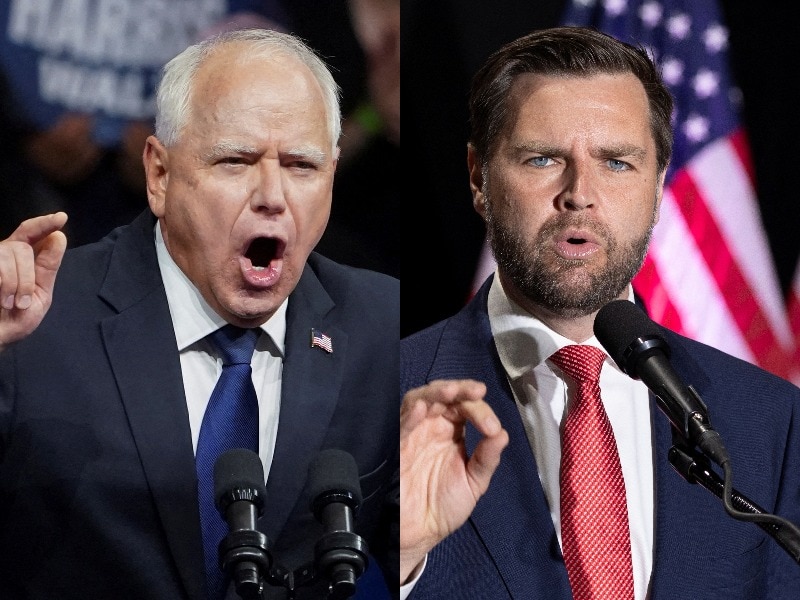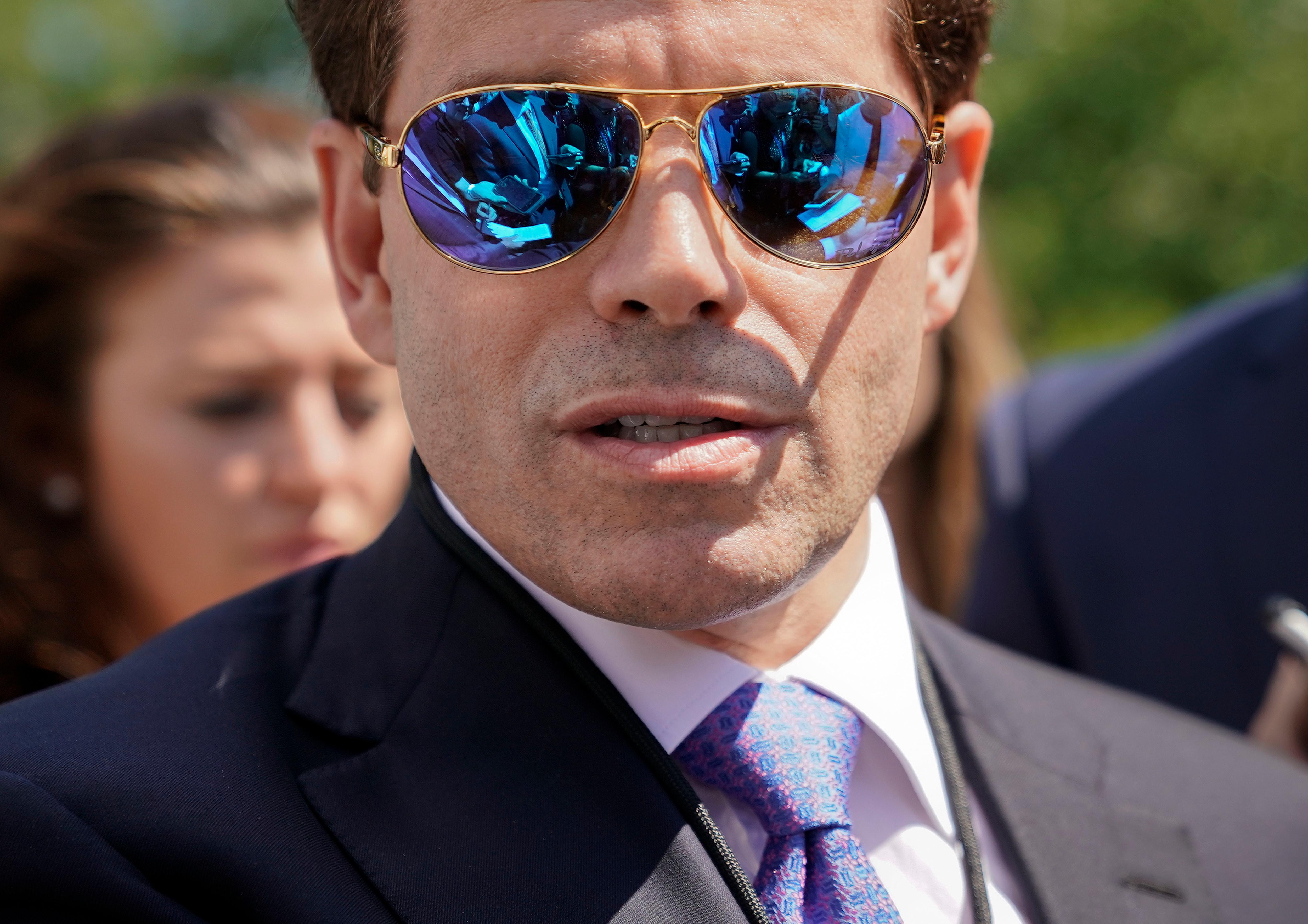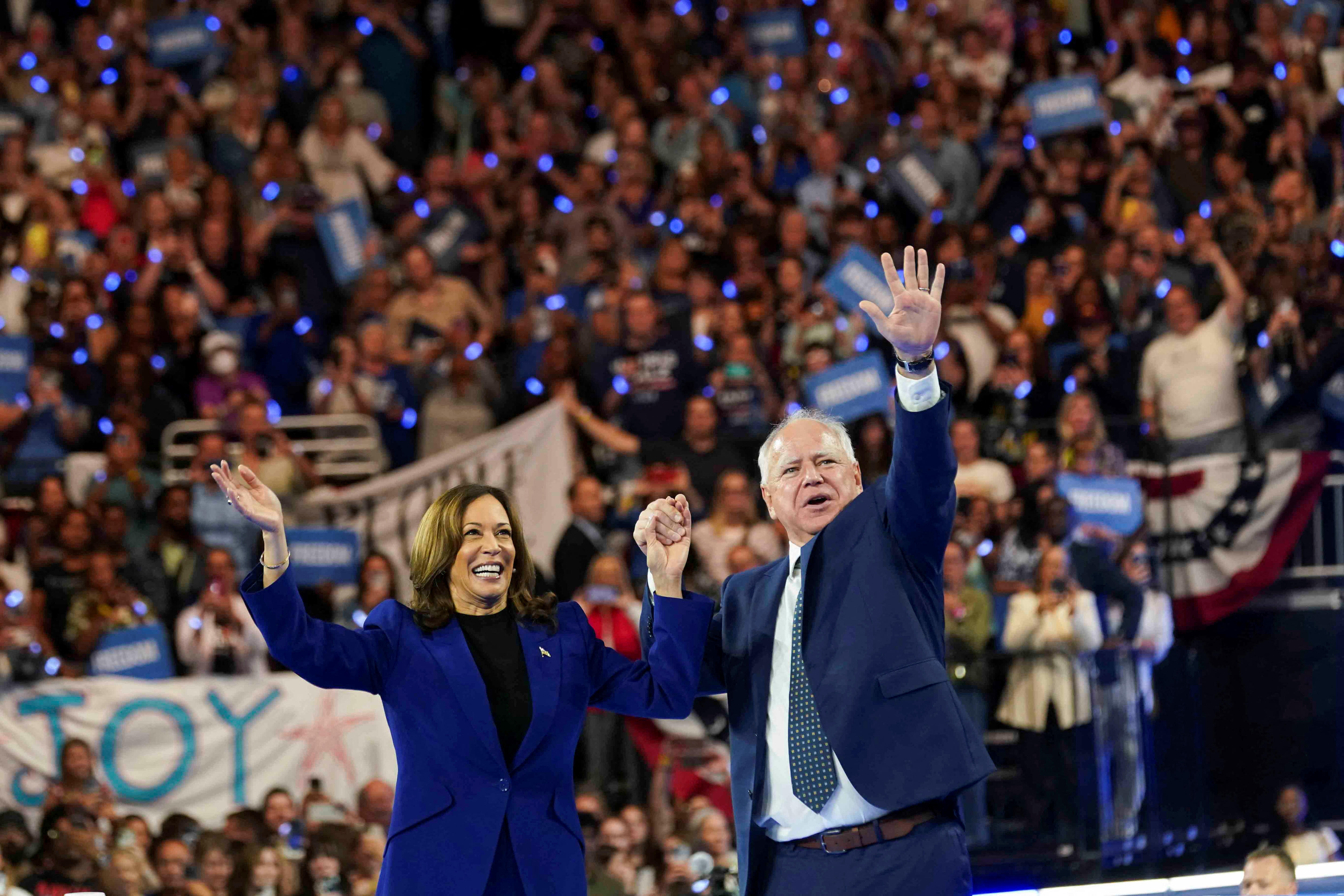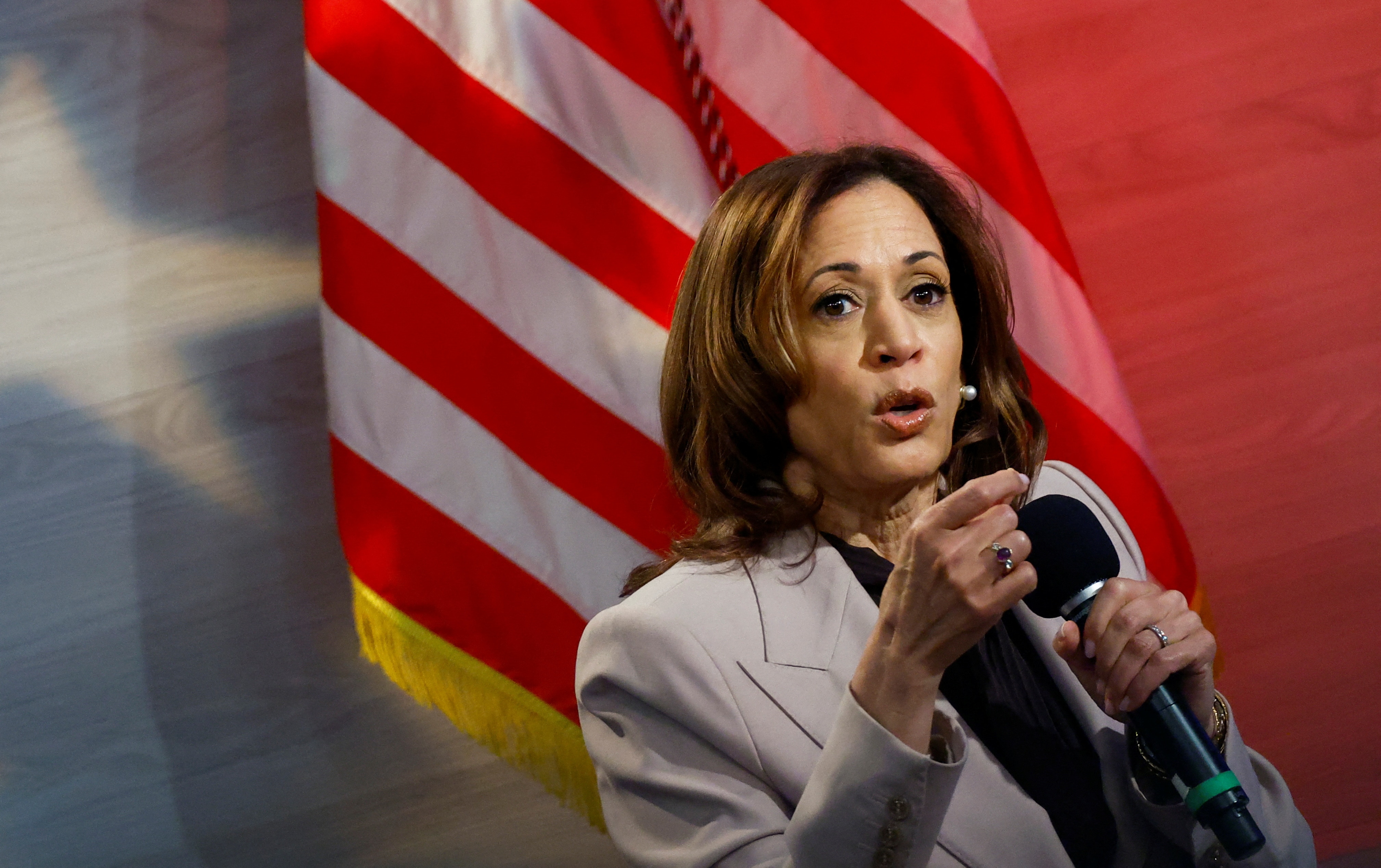Political debate winners don't always become president: keep that in mind as you watch today's clash between Walz and Vance

Do vice-presidential debates influence election outcomes in the United States? They never have in the past.
A twist few people could have predicted in the surprise-packed US presidential election was the triumphant return to public life of The Mooch.
If you've forgotten, Anthony "The Mooch" Scaramucci was the brash, reflector sunglasses-wearing finance guy from Long Island who briefly acted as Donald Trump's press secretary in 2017. He lasted a grand total of 10 days before Trump sacked him.
This year, The Mooch is back, co-hosting a podcast called The Rest is Politics US with former BBC journalist Katty Kay, modelled on the immensely popular British program of the same name with Labour media legend Alastair Campbell and former Tory MP Rory Stewart. Both are huge hits, consistently near the top of podcast charts.
Scaramucci and Kay offer excellent insights into campaign strategy and American political history. They have a vast network of contacts keeping them abreast of inside thinking in the Trump and Harris camps. A bonus is their witty banter (in a recent episode, The Mooch suggested that the 50-day term of the shortest-serving prime minister in British history, Liz Truss, could be measured as "five Scaramuccis").

Anthony Scaramucci served in the Trump White House for just 10 days.
After the recent presidential debate between Kamala Harris and Donald Trump, Kay and Scaramucci declared it a comprehensive Harris victory, the all-but-universal analysis of the media and political commentariat.
"Certainly, if this was a job interview and you had to choose between these two people who to make CEO of your company, just on the case of who was better prepped and who had the better temperament and who was more lucid and calm and gave more cogent answers, I think it would be hard to deny that you wouldn't have given the job of CEO to Kamala Harris," Kay declared, to The Mooch's firm agreement.
Of course, any rational analysis of that debate had to assess Harris as the more prepared, coherent, measured and sensible candidate.
There is a problem, though, with picking the winners of political debates and predicting electoral victory through that prism — something worth bearing in mind today when you read about the vice-presidential clash between Republican JD Vance and Democrat Tim Walz.
We vote with our emotions
The issue is this: If voters are hiring a president based on the qualities one looks for in a CEO, wouldn't Hillary Clinton have stormed to victory in 2016?
Against Trump, she was also the more prepared, coherent, measured and sensible candidate.
On that measure, Al Gore would have decimated George W Bush in 2000 too.
To move the discussion back to The Rest is Politics franchise, the considered and accomplished Rory Stewart would have smashed the smart but shambolic Boris Johnson in their 2019 tussle for leadership of the British Conservative Party.
And if voters are hunting for a preferred CEO, wouldn't you expect Harris to already hold a crippling lead over Trump in opinion polls?
Instead, they are close to a national dead heat (The New York Times poll tracker, which collates credible polls, has Harris inching ahead but right at the margin of error).
How can the election even be competitive if it's true that Harris is so clearly the person you'd hire as CEO?
It's because the way people think about politics, form their political beliefs and vote for their preferred candidates is not the same as the way they hire an employee. A political decision is far more closely tied to emotions.
To a significant degree, we vote based on our values and beliefs — which are linked to our emotions — not on targets, profit and KPIs — the intellectual language of the workplace, where emotions and deeply held personal and religious views are meant to be kept private.
We often vote for a party because we hate the other one
In his 2020 book Why We Are Polarized, New York Times columnist Ezra Klein examines voter motivation. Fifty years ago, people voted mostly according to what's called positive partisanship: you vote for the party you like the best. That's usually because its values align with your own and because you believe in what the party stands for. Even on issues you personally know little about, you trust your party to pick the right policy based on your shared priorities.
For example, in Australia, take the complicated field of renewable energy subsidies. Labor supporters who don't know much about the subject would likely trust Labor to be motivated by core beliefs on climate change action and collectivism.

Is Kamala Harris's campaign vibe, based in joy and hope, the right fit for the times?
At the other end of the spectrum, Liberal voters would trust their party to be driven by belief in the free market, small government and individual choice, the values its supporters hold dear. Voters put faith in their preferred parties to choose policies that are consistent with their publicly stated principles. In other words, people vote FOR something.
Not so much anymore though. In his book, Klein notes that in recent decades, American voters have become more motivated by negative partisanship than positive. In other words, you vote for a party because you really hate the opposing party. You don't have to particularly like, trust, understand, agree with or even know what your party is offering, you simply have to find it less offensive than the values and beliefs of the other side.
What are the implications of growing negative partisanship for the 2024 US presidential election?
Read more on the US election:
- Donald Trump rules out another debate with Kamala Harris
- Trump says Taylor Swift will 'pay a price' for backing Harris
- Kamala Harris needed to win over middle America in the debate
Whose message will resonate more?
One of them is the open question as to whether Harris's campaign vibe, based in joy and hope, is the right fit for the times.
The public mood is sour. Opinion polls consistently show that a majority of Americans feel their country is heading in the wrong direction and that they are deeply concerned about inflation, the cost of living, border control and crime. Many of those voters are looking to shake up a system that they feel has let them down for a long time.
What will resonate more: Harris's positive message that we can work together to fix this, or Trump's bile-filled and resentful diatribes?
Another implication is that negative partisanship is a field in which Trump has always excelled. His ability to whip up rancour and anger against his enemies is politically unprecedented. He violates accepted standards of public conduct in this pursuit. In the 2015 Republican primary campaign, he publicly sledged American war hero Senator John McCain as a "loser" because he had been captured and interred in a Vietnamese prisoner of war camp for five years.
Trump's most notable moment in the recent debate against Harris was falsely claiming that Haitian immigrants in Ohio were eating pet cats and dogs. Amid the controversy that followed, Trump's running mate, JD Vance, admitted their campaign had no problem concocting fabrications whenever they saw an advantage in doing so.
The only surprising thing about Trump's cats and dogs remark was that commentators acted as if it was shocking, or potentially a game changer. Trump has been making similar remarks for years and they work for him. Voters may know logically that Trump has taken things too far, or that he has made a false statement, but the "vibe" resonates.
In the case of the "cats and dogs" comment, such an extreme remark ensured immigration would be front and centre as a post-debate talking point. The message Trump no doubt wanted voters to take away is, "Sure, he may have gone too far with that cats and dogs thing — still, at least we know for certain that he's anti-illegal immigration … he's definitely more down that end than Harris."
If Trump walked away from the debate with undecided voters positive that he is tougher than Harris on immigration, one of the key issues in this election , that's a plus for him, regardless of whether he "won" the debate by appearing more like a competent chief executive.
What can we expect in today's debate?
So how does Harris compete against a negative campaigner with such base standards?
She has a few crucial assets.
One is that she's highly competitive in the polls, she's out-fundraising Trump and she has reality on her side: she is the more coherent candidate. While the national polls are tight, Harris has considerably improved the Democrats' standing since replacing Joe Biden as their nominee. She's consistently trended in the right direction and there's no evidence at the time of writing that she's stalled.
Two is that this election is not a repeat of 2016. The American public has already experienced four years of a Trump presidency so he's not an unknown. They have a record on which to judge him, one that ended in scores of criminal charges. He no longer has the outsider or change-agent status that he ran with eight years ago.

While the national polls are tight, Kamala Harris has improved the Democrats' standing since replacing Joe Biden as their nominee.
Three is that the Harris-Walz campaign is already having some success with negative partisanship. Harris was on that path during the debate by goading Trump and using her body language to indicate that she found him ridiculous. Walz is the one who came up with the line of attack that the Trump-Vance ticket is "weird", a theme you can expect him to reinforce in today's debate against JD Vance.
Walz and Vance will both attempt to push voters' buttons in ways that reinforce their dislike of the opposing party. Walz will stick to his message that the Republican team is odd and not a safe choice to run the country. Vance will attempt to convey that borders and the cost of living will be out of control under Democrats. He'll also likely reach for "woke liberal" tropes in an effort to stoke fear and division on topics that may include crime, gender politics and national security.
Do vice-presidential debates significantly influence election outcomes in the United States? They never have in the past.
All today's debate is likely to do — barring any kind of surprise — is reinforce the vibe of each campaign.
The Harris camp will want viewers to walk away believing that she is a positive, unifying force for America and that Trump is the opposite. On the Trump side, the message will be that only he can make America great again and that a vote for his opponents is a vote to keep the United States heading in the wrong direction.
By:https://www.abc.net.au/news/2024-10-02/political-debate-winner-vice-presidential-debate-walz-vance/104416898(责任编辑:admin)
下一篇:Iran fires barrage of missiles at Israel with explosions heard above Tel Aviv, Jerusalem — as it happened
 Socceroos rescue a point
Socceroos rescue a point  Wallabies thrash Wales 52
Wallabies thrash Wales 52 Jake Paul beats Mike Tyso
Jake Paul beats Mike Tyso Live updates: England vs
Live updates: England vs  US election 2024: Donald
US election 2024: Donald  US election live: Kamala
US election live: Kamala
- ·North Korea's latest weapon agains
- ·Hezbollah says Israel 'cannot impo
- ·Inside the rise of US oligarchs and how
- ·Thailand's worst suspected serial
- ·Tabi shoes are turning heads from Holly
- ·FBI arrests Florida man planning attack
- ·Illegal immigrant gets life sentence fo
- ·Bibles, water, watches and sneakers: Do
- ·North Korea's latest weapon against
- ·Hezbollah says Israel 'cannot impose
- ·Inside the rise of US oligarchs and how i
- ·Thailand's worst suspected serial ki
- ·Tabi shoes are turning heads from Hollywo
- ·FBI arrests Florida man planning attack o
- ·Illegal immigrant gets life sentence for
- ·Bibles, water, watches and sneakers: Dona
- ·US to give Kyiv anti-personnel landmines
- ·An arrest warrant for Benjamin Netanyahu
- ·One of Vietnam's high-profile politi
- ·Shanghai Walmart Attack: A Man Randomly S
- ·South Korean police officers jailed over
- ·Cambodia publicly shames maid deported af
- ·North Korea to use all forces including n
- ·Philippines condemns China attack of Viet
- ·US adds 2 more Chinese companies to Uyghu
- ·North Korean defector steals South Korean
- ·Malaysia deports Cambodian worker for cal
- ·Rebels battle for Myanmar junta’s weste

